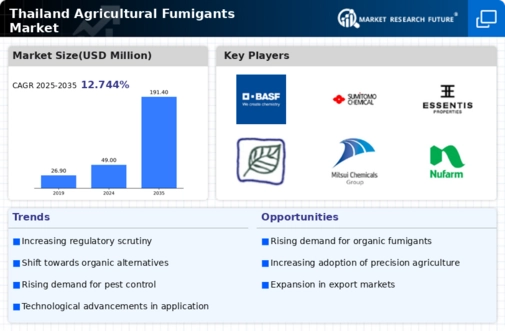Increased Pest Resistance
The agricultural fumigants market is significantly influenced by the rising issue of pest resistance in Thailand. As pests evolve and develop resistance to conventional pesticides, farmers are compelled to seek alternative solutions. Fumigants offer a viable option for controlling resistant pest populations, thus maintaining crop health and productivity. Reports indicate that pest resistance has led to a 15% decline in crop yields in certain regions, prompting a shift towards more effective fumigation methods. This situation indicates a growing reliance on agricultural fumigants as a critical tool for pest management, potentially driving market growth in the coming years.
Expansion of Export Markets
Thailand's agricultural fumigants market is poised for growth due to the expansion of export markets for agricultural products. The country is a major exporter of rice, fruits, and vegetables, and maintaining high-quality standards is essential for international competitiveness. Fumigants play a crucial role in ensuring that exported goods meet stringent phytosanitary regulations. In 2023, agricultural exports accounted for approximately $30 billion, underscoring the importance of effective pest control measures. As Thailand seeks to enhance its export capabilities, the demand for agricultural fumigants is likely to increase, further stimulating market development.
Rising Demand for Food Security
the agricultural fumigants market is experiencing a notable increase in demand driven by the need for enhanced food security. As the population continues to grow, the pressure on agricultural productivity intensifies. Farmers are increasingly adopting fumigants to protect crops from pests and diseases, thereby ensuring higher yields. In 2023, the agricultural sector contributed approximately 8.5% to Thailand's GDP, highlighting its significance. The government has also recognized the importance of maintaining food supply chains, which further propels the use of agricultural fumigants. This trend suggests that the market will likely expand as farmers seek effective solutions to combat agricultural challenges.
Government Support and Initiatives
the agricultural fumigants market benefits from various government support initiatives aimed at promoting sustainable agricultural practices. The government has implemented programs to educate farmers about the safe and effective use of fumigants, which is crucial for both crop protection and environmental safety. Additionally, subsidies and financial assistance for purchasing fumigants are available, making them more accessible to farmers. In recent years, the government has allocated approximately $50 million towards agricultural development, which includes funding for pest management solutions. This support indicates a favorable environment for the growth of the agricultural fumigants market.
Technological Innovations in Fumigation
Technological advancements in fumigation techniques are reshaping the agricultural fumigants market. Innovations such as precision application methods and improved formulations are enhancing the efficacy and safety of fumigants. These advancements not only increase the effectiveness of pest control but also reduce environmental impact, aligning with sustainable agricultural practices. The introduction of smart technologies in agriculture, including drones for application, is expected to revolutionize the market. As farmers become more aware of these innovations, the adoption of advanced fumigation methods is likely to rise, contributing to market growth.



















Leave a Comment